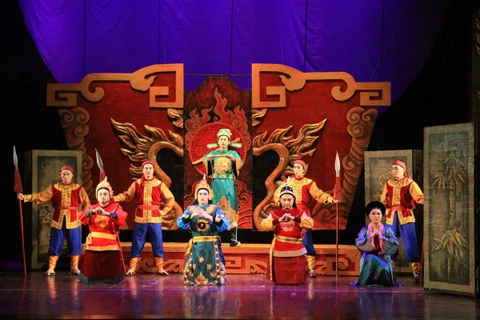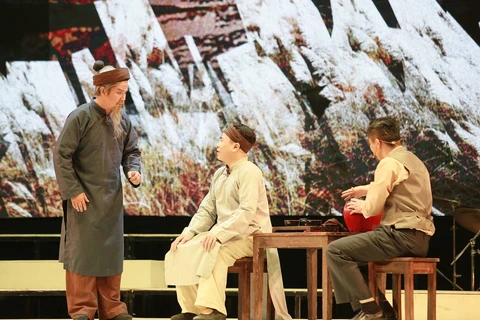 A scene in “Chen thuoc doc” (A cup of poison) – the first western-style play in the history of Vietnam. (Photo: VietnamPlus)
A scene in “Chen thuoc doc” (A cup of poison) – the first western-style play in the history of Vietnam. (Photo: VietnamPlus)
Hanoi (VNA) - Vietnamese theatre will certainly stand on the brink of total collapse if there are no formal training and serious investment from the government, according to People’s Artist Giang Manh Ha, Vice Chairman of Vietnam Artists Association.
Talented writers play a decisive role in the success of Vietnamese stage theatre, which still lags behind the theatre industry of many countries in the world, Ha said, stressing artists need to receive training in the world’s art centres.
“We hope the country will outline specific strategies and plans to develop the theatre so that Vietnamese theatre can take off in the future”, Ha said.
The thousand-year-old culture of Vietnam is so rich in theatrical tradition – be it plays, comedies, tragedies or musicals – that each region seems to have its own operatic form.
A western genre of performing art called kich noi (straight play), also made its debut in the country in the early 20th century. With the premiere of Chen thuoc doc, or “The Cup of Poison”, penned by playwright Vu Dinh Long in 1921, the western-style play – without singing – was born. The genre now celebrates its 100th anniversary in the country.
Theatre critics agreed that such plays came to Vietnam with the French long after they invaded the country, at some point during the latter half of the 19th century.
The first French play performed in Hanoi in Vietnamese language, translated by Nguyen Van Vinh, premiered in the city's Opera House on April 20, 1920. It was Le Malade Imaginaire (The Imaginary Invalid) by Molière.
During that time, such plays were only popular among the ruling French and some western-trained local intellectuals, while your average audiences preferred singing in their performances.
One and half year after the Molière premiere, Vu Dinh Long presented his play “Chen thuoc doc” at Hanoi’s Opera House, and more local playwrights began penning their own scripts.
During the brief period of less than two years when President Ho Chi Minh declared Vietnam's independence in 1945 and before they had to retreat to the mountains in the north for a nine-year long war of resistance against the French, theatrical plays flourished in Hanoi. Small groups between five and 10 people got together to play, and often even bigger groups.
The form was a useful way to communicate to the wider public, with plays written to commemorate heroic ancestors and call on the masses to rise up against the French colonialists.
Clear prose that was sharp and easy to grasp was a popular quality of theatrical plays, and even inspired the common people to go to evening classes to learn to read and write to reduce the illiteracy rate and encourage economic production.
Vietnamese theatre was in a golden period during 1970s-1980s, with such renowned plays as “Rung truc”, “Dong song am anh”, “Nhan dan cong ly” and “Ha My cua toi”. However, it is now plunging into crisis, according to Associate Professor, PhD Pham Duy Khue.
“Old mind together with a lack of understanding of people’s feelings has made theatre fail to reflect the reality, thus making itself less attractive to audience”, Khue added.
Meanwhile, Associate Professor, PhD Nguyen Thi Minh Thai from the Vietnam Stage Artists Association, held that Vietnamese straight plays have lost constant dialogue with audience and real life.
“Theatres are starring at empty seats. Although small stages established in the south were favoured by locals, they were forced to close soon. Several private stages were set up, including those of Tran Luc, Le Ngoc, and Hong Van, to save the Vietnamese theatre”.
“Developing theatre into an industry that can earn money is the only way to make theatre flourish again. Our neighbours did it successfully, and we can do that, too”, she added./.























